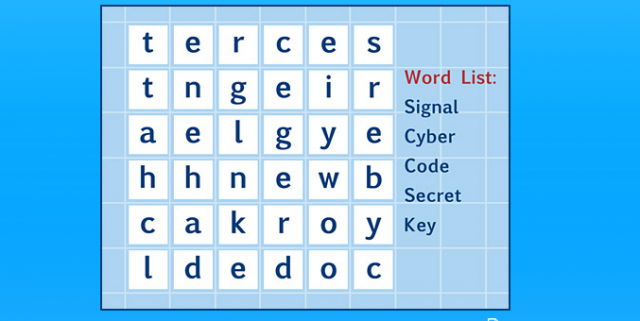
The National Security Agency wants your kids to know that it's cool to be "cyber smart."
As part of the agency's outreach to promote interest in technology and recruit a future generation of computer security experts, the NSA has links on its homepage to two sites targeted at children and adolescents. The "Kids Page," intended for elementary age children, appears to be down at the moment—either that, or the error code reference (Reference #97.887ffea5.1374616699.dc7bfc5) is an encoded message to grade school operatives that it's time to report in.
But the "Change The World" page, targeted at middle and high school students, is chock full of crypto-clearance fun. There's a word search, a PDF to print to make your own letter substitution code wheel, and a collection of tips on how to be a good cyber-citizen. Ironically, some of these tips might be useful for people concerned about how much data is being collected on them through broad metadata collection and FISA Court warranted PRISM probes.
Among the NSA's tips for kids is this sage wisdom: "Be cyber courteous! It is too easy to hide behind a computer! A cyber smart person never says anything online that they wouldn’t say in person. Remember that what you write in an e-mail can usually be retrieved and shared with others, so be responsible with e-mails, chats, and online communications." Especially since those e-mails, chats, and online communications could be getting captured in real-time by one of the NSA's network taps.
The NSA does offer kids some helpful password advice. "Try this: Take four random words…take the first three letters of each word, make some letters upper case and others lower case, then add any two or three numbers and then some character like @#$%&... the password should be at least 14 characters and memorable (or write it down but protect it). You should have a different password for each account that you have!" The NSA also suggests that kids only share their passwords with their parents. "No one else should have them—not your friends, teachers, or other family members."
The NSA wants kids to look out for software trojan horses and to play fair. "Do you download 'cheat' programs that promise information to how to perform better or beat a game?" the site asks. "Sometimes cheat downloads are used to implant a virus or malware on your computer!"
There's also some helpful information on protecting kids' identities online, including how to behave on social networks and in online games. "Do you use an avatar? You should. While cameras and webcams are popular, they also reveal who you are. When gaming, keep your true identity a mystery. Cyber sleuths never reveal their true identity except to trusted adults, like your parents!"
reader comments
45